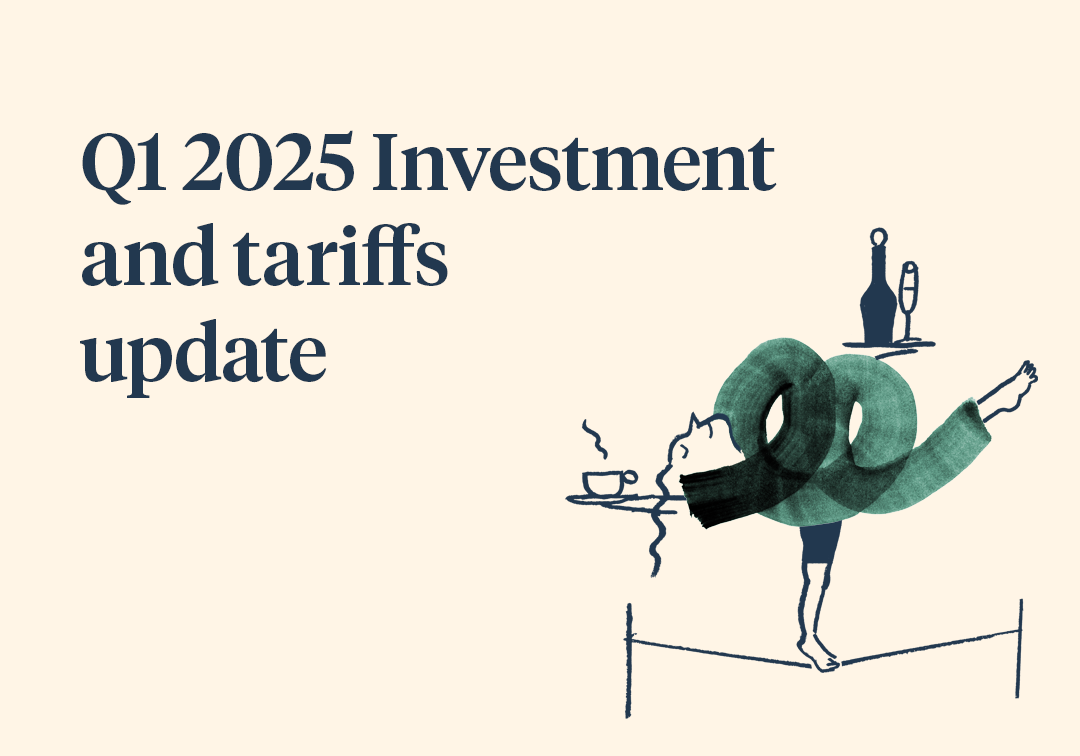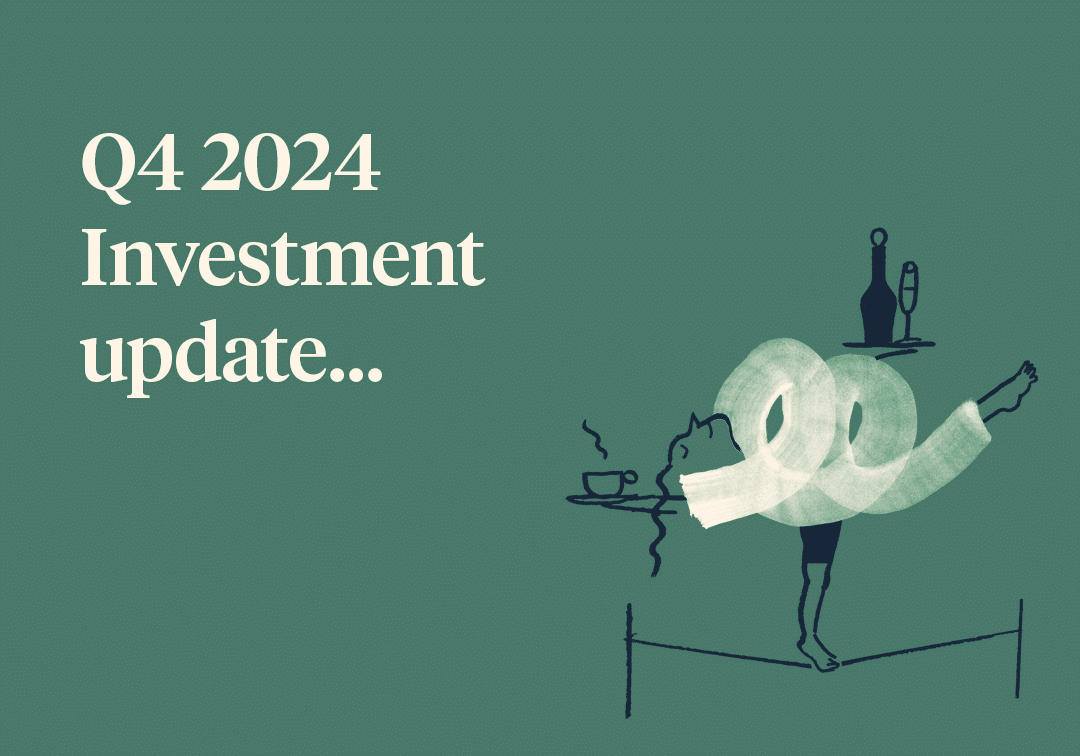Transcript
Jordan Gillies:
Hello and welcome to our Q1 2023 update. My name is Jordan Gillies and I’m one of the partners here at Saltus, and I’m joined by a member of our investment team, once again, Michael Stimpson to hopefully give you a useful overview of what’s happened in the past quarter.
So, Mike, this quarter has been quite something. We’ve had a market rally. We’ve had a correction. Inflation’s not been doing what people expected. We then saw the collapse of some banks in the US, but that also wasn’t as bad as people thought, but it’s caused some concerns. It’s been a rollercoaster ride. So, if you were going to even try and summarise what’s been going on in this quarter, could you do that and start with that for us?
Michael Stimpson:
Sure, Jordan. So, I think there was a quote from Lenin, where he said, “There are decades when nothing happens, and then weeks where decades happen.” It sort of feels a bit like that in markets at the moment. If we go back to the beginning of the year, 2022 was a very difficult year, as we know, due to the simultaneous sell-off between equities and bonds, because inflation was higher and therefore interest rates went up. So, our starting point in January was that sentiment was terrible, prices were lower after the falls, but the underlying economy was starting to get a little bit stronger because China was starting to reopen, the oil price was 40% below where it had been a year earlier, and inflation data was starting to come down. So, it was no great surprise that we had a relief rally and that is what we saw in January, where all the worst-performing investments in 2022 suddenly led the rally in January.
As we move through that, into February, there was a bit of a dose of reality where inflation numbers stuck at a little bit higher than expected, not a lot, just a little bit and that reminded people that the inflation story may not be over, and we gave back about half of those January gains. And then, as you mentioned, when we came into March and we had the banking crises where two large, very significant banks, Silicon Valley Bank in the US and Credit Suisse in Switzerland, disappeared over the course of a couple of weekends, which was very surprising. They disappeared very quickly. That led to some huge moves in the bond market. There was a two-week move that was a six-standard deviation event. That means that there’s a one in 3.5 million chance of that happening. But two weeks later, we were broadly back to where we were, and things had calmed down almost entirely.
Jordan Gillies:
Mike, why was that? Because with an event of that size, and I think also 2008 doesn’t seem that far long ago, this just didn’t seem to get the momentum of previous banking crises. So, what was different about it?
Michael Stimpson:
So, I think there are two things. One is speed. If we look back at 2008, it would’ve taken six months for the banks to fail the way they did. But I think on the positive side, what it shows is that some lessons have been learned. So, the regulatory authorities now know what to do and, broadly, we haven’t had further contagion. We’re not looking around for the next bank, thinking that suddenly the whole banking system might be in danger. What led to such sharp moves was there are still lots of leverage players in the markets and so, when you have those unexpected events, you have leverage players trying to unwind positions into illiquid markets and that just moves the price very significantly. Having said that, there are some negatives as well. There will be other weak banks around, that at some stage people will start to look to and, perhaps most importantly, risk appetites in the banking sector will fall. And so, credit conditions will become tighter.
Jordan Gillies:
So, how did we finish the quarter, given that it was such a rollercoaster ride? What did it look like for our clients?
Michael Stimpson:
So, clients ended up with positive returns between 1% and 2.5%, depending on your risk profiles. It was a difficult environment though, most of our active managers failed to beat their benchmarks. About 80% of active managers overall underperformed in these sorts of whip-soaring conditions, which makes it quite tricky. But overall, clients have made money in the first quarter.
Jordan Gillies:
Okay. So that is potentially a little bit surprising, given the size of the moves that you just commented on there. So, what did we actually do in the portfolios over Q1 to make that better out?
Michael Stimpson:
We started the quarter, you’ll remember, withholding a little bit of risk back from our risk budgets. We exited a US small and mid-cap play in Granahan, in January, which proved to be a really good move, because they then had a very difficult February and March, given all the things that happened. We’ve started to move some cash into longer-dated bonds, to put some duration back in the portfolio. We’re doing this in a very measured way. In fact, if we’d done this more quickly, we would’ve made more money, but we are being very careful and measured with how we put money into the bond market. We’ve also started to move back into some alternatives, which do better in volatile times. So, our commodity exposures of copper and gold both performed well. Lazard Rathmore, which is a convertible arbitrage fund that we’ve talked about before, we’ve started to add to that position again, because this is a better way for us to get that small and mid-cap exposure, rather than just owning the equities.
Jordan Gillies:
Is this kind of a slight concern about risk returning to the bond markets as well? And how do we feel about risk, generally, across the portfolios?
Michael Stimpson:
Yeah, so if we think about looking forward over the next 12 months, we think there are two major risks that we need to resolve. The first is earnings risk. Analysts have revised their earnings forecast down by about 12% from the peak, which may or may not be enough. Traditionally, if we do see a recession, earnings fall more like 25% and economists are telling us there is a recession coming, it hasn’t come yet, but it is going to come. So, there’s that disconnect between, will it be a shallow recession, in which case maybe the earnings revisions are enough. If not, we’ve probably got some more to do there. The other point is around the bond market disagreeing with the Fed. So, we’re now in a position where the bond market is saying, “Okay, we think the inflation story is over. Inflation’s coming down and the Federal Reserve needs to pivot over the summer and start to reduce interest rates, to support growth.”. And the Federal Reserve is still saying very clearly, “No, no, no. Inflation is our number one priority. It’s going to be stickier for longer. And so, you can expect interest rates to stay higher, before coming down in 2024.”
And I think that is the single, biggest thing that we are looking at and nervous about, because twice last year we had a dislocation between the bond market and the Federal Reserve, and both times it was quite painful for bond and equity holders. So, we’re watching that very closely.
Jordan Gillies:
That’s quite a defensive position. Do we have any ideas of opportunity opening up in this type of environment at all?
Michael Stimpson:
Definitely. The China reopening creates some opportunities. There are some good internal drivers in Japan, that makes that equity market look interesting. But overall, I’m afraid there are not lots of cheap ideas that we are desperate to get involved within, with at the moment. And therefore, as we go into our next asset allocation cycle, which starts next week, we are maintaining our risk levels about 10% below their budgets, while we wait for better opportunities.
Jordan Gillies:
Okay. So that kind of famous phrase, that managers always use, of cautiously optimistic might just be cautious at the moment. Is that a fair summary?
Michael Stimpson:
Yes. I think we are waiting for better opportunities to be optimistic.
Jordan Gillies:
Okay. Well look, thanks Mike, and I hope you enjoyed the quarterly update, and we look forward to seeing you at the next one.
Do you need help managing your investments?
Our team can recommend an investment strategy to meet your financial objectives and give you peace of mind that your investments are in good hands. Get in touch to discuss how we can help you.

Article sources
Editorial policy
All authors have considerable industry expertise and specific knowledge on any given topic. All pieces are reviewed by an additional qualified financial specialist to ensure objectivity and accuracy to the best of our ability. All reviewer’s qualifications are from leading industry bodies. Where possible we use primary sources to support our work. These can include white papers, government sources and data, original reports and interviews or articles from other industry experts. We also reference research from other reputable financial planning and investment management firms where appropriate.
The views expressed in this article are those of the Saltus Asset Management team. These typically relate to the core Saltus portfolios. We aim to implement our views across all Saltus strategies, but we must work within each portfolio’s specific objectives and restrictions. This means our views can be implemented more comprehensively in some mandates than others. If your funds are not within a Saltus portfolio and you would like more information, please get in touch with your adviser. Saltus Asset Management is a trading name of Saltus Partners LLP which is authorised and regulated by the Financial Conduct Authority. Information is correct to the best of our understanding as at the date of publication. Nothing within this content is intended as, or can be relied upon, as financial advice. Capital is at risk. You may get back less than you invested. Tax rules may change and the value of tax reliefs depends on your individual circumstances.
Related blog posts
About Saltus?
Find out more about our award-winning wealth management services…
Winner
Best Wealth Manager
Winner
Investment Performance: Cautious Portfolios
Winner
Top 100 Fund Selectors 2024
Winner
Best Places to Work 2024
£8bn+
assets under advice
20
years working with clients
350+
employees
97%
client retention rate

